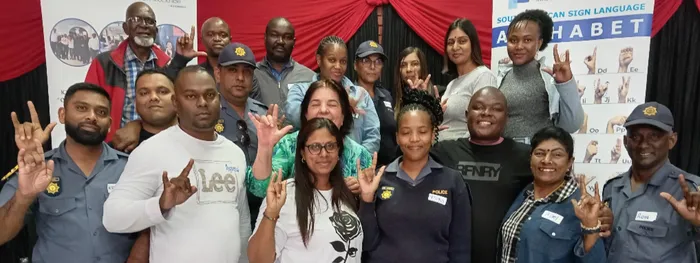SAPS officers learn sign language to better serve the deaf community
Communication barrier

SAPS and metro police attended the recent sign language workshop in a bid to close the communication barriers faced by deaf citizens seeking police assistance.
Image: RACHEL VADI
A GROUNDBREAKING workshop in Phoenix brought together SAPS, metro police, and the KwaZulu-Natal Deaf Association (KZNDA) to address the alarming communication barriers faced by deaf citizens seeking police assistance.
Despite sign language being South Africa’s 12th official language since 2023, deaf individuals continue to face discrimination and inadequate services when reporting crimes, especially in cases of gender-based violence (GBV).A recent survey by a Phoenix-based, non-profit organisation, the Daniella Simone Keisha (DSK) Group, found a dire need for assistance for people with speech and hearing impediments at State-run facilities like police stations.
The survey found that services offered by many such institutions remained out of reach for deaf and hard of hearing people in the community.
“We found that deaf people are intimidated and afraid to go to the police stations.
“A number of disabled people started coming to the DSK Group asking for assistance, especially with GBV,” said the founder of the NPO Daniel Chettiar.
He said a recent example was that of a 36-year-old man who sought assistance from his local police station after he was beaten “like a rugby ball” following a dispute with his neighbour over a dog pooping in his yard.
“When the man went to the police station, the first officer could not understand him and asked him to take a number and wait in line.
“When he tried sign language, the second officer told him to go back to the line and wait for assistance. When no assistance came because noone could understand him, the man left the station frustrated and feeling defeated,” said Chettiar.
“He somehow came to us with his problem and we had to take him to the police station for help. There are just too many cases like this,” he said.He said in the last year, they had dealt with a 112 such cases.
“Deaf people are among the most vulnerable in our community, and they need help,” said Chettiar. Understanding this dire need, the Rapid Response Team (RRT) and DSK have joined forces with the SAPS, metro police, and the KZNDA for a series of workshops to help police officers better communicate with people who have hearing and speaking disabilities.
The director of the KZNDA, Dale Schonewolf, said deaf people faced daily challenges such as marginalisation, discrimination, language barriers or miscommunication and misunderstandings, GBV and other crimes.
“One of the KZNDA’s focus areas is GBV and its impact on deaf women and girls who become victims of secondary abuse due to the communication barriers/challenges they face when attempting to report such incidents.
“Deaf people face numerous barriers when reporting cases of domestic violence, rape, harassment, etc. They are unable to report the incident to SAPS, unable to access health services, the Thutuzela Care Centres (TCCs) or judicial services like the Family Court,” said Schonewolf.
“That is why we have formed partnerships with the RRTs to try and alleviate the communication challenges faced by deaf victims of GBV.The KZNDA has designed 1-day Deaf Sensitisation and basic SASL workshops which are conducted with the members of the RRTs.
Participants are sensitised to deaf culture and are taught basic generic signs and signs specific to GBV with the aim of them being able to conduct an interview with a deaf person and refer them to the relevant channels for further assistance.
Speaking at a workshop recently at Stanmore Secondary in Phoenix, Schonewolf said: “This was the first time that we had SAPS members attend one of our workshops.
“They have become more aware of the huge challenges deaf people face when reporting incidents of any form of abuse.
“The activities were very interactive and gave participants an opportunity to practise signs learned. Many of them expressed the need for these workshops to be ongoing.”
THE POST https://thepost.co.za/news/
Related Topics: